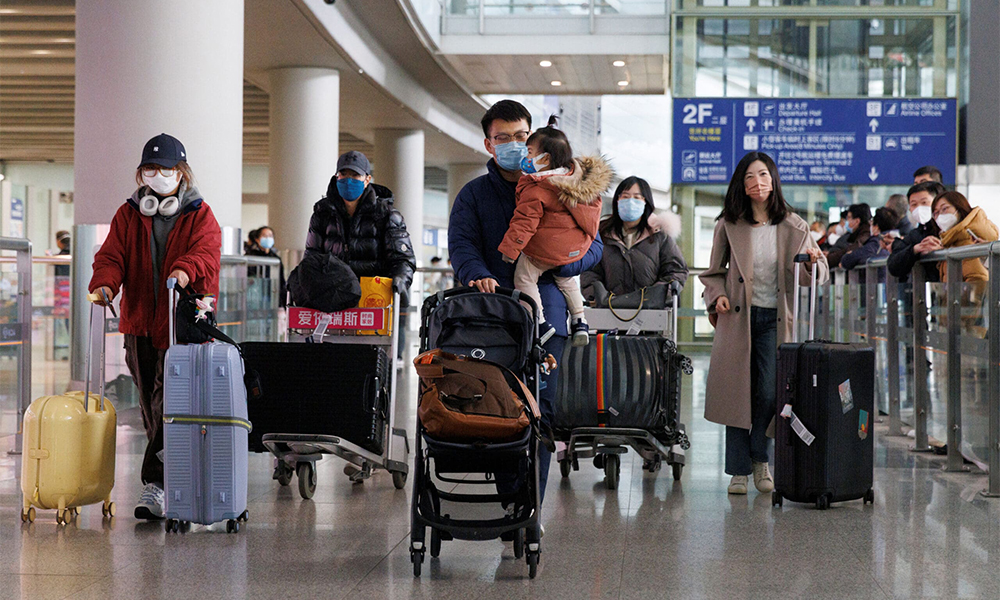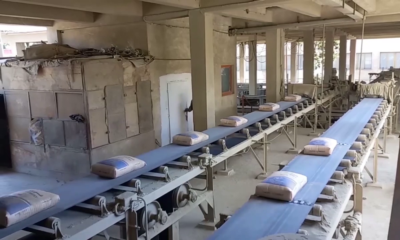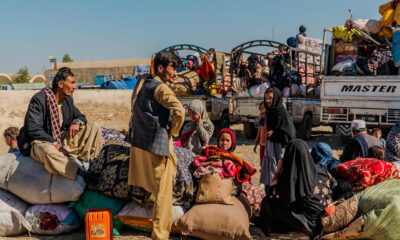COVID-19
China declares new COVID phase

China braced for a “new phase” in its battle against COVID-19 on Monday and financial markets strengthened after Beijing dropped pandemic border controls in the latest easing of curbs that has let the virus loose on its 1.4 billion population, Reuters reported.
Sunday’s reopening is one of the last steps in China’s dismantling of its “zero-COVID” regime, which began last month after historic protests against curbs that kept the virus at bay for three years but caused widespread frustration among its people and severe damage to the world’s second-largest economy.
While Beijing’s move to drop quarantine is expected also to boost outbound travel, several nations are demanding negative tests from visitors from China, seeking to contain an outbreak that is overwhelming many of China’s hospitals and crematoriums.
“Life is moving forward again!,” the official newspaper of the Communist Party, the People’s Daily, wrote in an editorial praising the government’s virus policies late on Sunday which it said had moved from “preventing infection” to “preventing severe disease”.
“Today, the virus is weak, we are stronger.”
China’s state Xinhua news agency said the country had entered a “new phase” of its COVID response, citing its virus prevention experience, the development of the epidemic and increased vaccination levels.
China’s top health officials and state media have repeatedly said COVID infections are peaking across the country and they are playing down the threat now posed by the disease.
That is in stark contrast to the earlier regime of strict quarantines and lockdowns as China managed the virus as a “Category A” disease like the bubonic plague and cholera. China’s management of COVID was technically downgraded to “Category B” on Sunday, although many curbs have been dropped for weeks.
Officially, China has reported just 5,272 COVID-related deaths as of Jan.8, one of the lowest rates of death from the infection in the world.
But the World Health Organization has said China is under-reporting the scale of the outbreak and international health experts estimate more than one million people in the country could die from the disease this year.
Shrugging off those gloomy forecasts, investors are betting that China’s reopening will help revive the $17 trillion economy and bolster the outlook for global growth.
Those hopes lifted Asian shares to a five-month high on Monday while China’s yuan firmed to its strongest level against the dollar since mid-August.
China’s blue-chip index (.CSI300) gained 0.7%, while the Shanghai Composite Index (.SSEC) rose 0.5% and Hong Kong’s Hang Seng Index (.HSI) climbed 1.6%.
“The ending of the zero-COVID policy is … going to have a major positive impact on domestic spending,” Ralph Hamers, Group Chief Executive Officer at UBS, told the bank’s annual Greater China Conference on Monday.
“We believe there is a lot of opportunity for those committed to investing in China.”
“It’s a huge relief just to be able to go back to normal … just come back to China, get off the plane, get myself a taxi and just go home,” Michael Harrold, 61, a copy editor in Beijing told Reuters at Beijing Capital International Airport on Sunday after he arrived on a flight from Warsaw.
Harrold said he had been anticipating having to quarantine and do several rounds of testing on his return when he left for Europe for a Christmas break in early December.
State broadcaster CCTV reported on Sunday that direct flights from South Korea to China were close to sold out. The report quickly shot to the most read item on Chinese social media site Weibo.
However, a spike in demand from South Koreans, who make up the largest number of foreign residents in China, as well as others, will be hampered by the limited number of flights to and from China, which are currently at a small fraction of pre-COVID levels.
Korean Air said earlier this month that it was halting a plan to increase flights to China due to Seoul’s cautious stance towards Chinese travellers. South Korea like many other countries now requires travellers from China, Macau and Hong Kong to provide negative COVID test results before departure.
Flight Master data showed that on Sunday, China had a total of 245 international flights, combining inbound and outbound, compared with 2,546 flights on the same day in 2019, representing a fall of 91%.
China’s domestic tourism revenue in 2023 is expected to recover to 70-75% of pre-COVID levels, but the number of inbound and outbound trips is forecast to recover to only 30-40% of pre-COVID levels this year, China News reported on Sunday.
COVID-19
WHO declares end to COVID global health emergency

The World Health Organization said Friday that COVID-19 no longer qualifies as a global emergency, marking a symbolic end to the devastating coronavirus pandemic that triggered once-unthinkable lockdowns, upended economies and killed millions of people worldwide.
The announcement, made more than three years after WHO declared the coronavirus an international crisis, offers some relief, if not an ending, to a pandemic that stirred fear and suspicion, hand-wringing and finger-pointing across the globe, AP reported.
The U.N. health agency’s officials said that even though the emergency phase was over, the pandemic hasn’t finished, noting recent spikes in cases in Southeast Asia and the Middle East.
WHO says thousands of people are still dying from the virus every week, and millions of others are suffering from debilitating, long-term effects.
“It’s with great hope that I declare COVID-19 over as a global health emergency,” WHO Director-General Tedros Adhanom Ghebreyesus said.
“That does not mean COVID-19 is over as a global health threat,” he said, warning that new variants could yet emerge. Tedros noted that while the official COVID-19 death toll was 7 million, the real figure was estimated to be at least 20 million.
Tedros said the pandemic had been on a downward trend for more than a year, acknowledging that most countries have already returned to life before COVID-19.
He bemoaned the damage that COVID-19 had done to the global community, saying the pandemic had shattered businesses, exacerbated political divisions, led to the spread of misinformation and plunged millions into poverty.
When the U.N. health agency first declared the coronavirus to be an international crisis on Jan. 30, 2020, it hadn’t yet been named COVID-19 and there were no major outbreaks beyond China.
More than three years later, the virus has caused an estimated 764 million cases globally and about 5 billion people have received at least one dose of vaccine.
In the U.S., the public health emergency declaration made regarding COVID-19 is set to expire on May 11, when wide-ranging measures to support the pandemic response, including vaccine mandates, will end. Many other countries, including Germany, France and Britain, dropped most of their provisions against the pandemic last year.
When Tedros declared COVID-19 to be an emergency in 2020, he said his greatest fear was the virus’ potential to spread in countries with weak health systems.
Most recently, WHO has struggled to investigate the origins of the coronavirus, a challenging scientific endeavor that has also become politically fraught.
COVID-19
COVID-19 in Iran: Nearly 900 new cases, 24 deaths recorded

The Iranian health ministry announced on Sunday that more than 890 new cases of COVID-19 have been identified across the country during the past 24 hours, adding that 24 patients have died in the same period of time, Fars News Agency reported.
“A sum of 891 new patients infected with COVID-19 have been identified in the country based on confirmed diagnosis criteria during the past 24 hours,” the Iranian Health Ministry’s Public Relations Center said on Sunday, adding, “454 patients have been hospitalized during the same time span.”
The ministry’s public relations center said 611 people infected with COVID-19 are in critical condition.
COVID-19
China says 200 million treated, pandemic ‘decisively’ beaten

China says more than 200 million of its citizens have been diagnosed and treated for COVID-19 since it lifted strict containment measures beginning in November.
With 800,000 of the most critically ill patients having recovered, China has “decisively beaten” the pandemic, according to notes from a meeting of the ruling Communist Party’s all-powerful Politburo Standing Committee presided over by President and party leader Xi Jinping, AP reported.
China enforced some of the world’s most draconian lockdowns, quarantines and travel restrictions and still faces questions about the origins of the virus that was first detected in the central Chinese city of Wuhan in late 2019. Heavy-handed enforcement prompted rare anti-government protests and took a heavy toll on the world’s second-largest economy.
The official Xinhua News Agency quoted Xi as saying that policies to control the outbreak had been “entirely correct.” The abrupt lifting in November and December of the “zero COVID” policy that had sought to eliminate all cases of the virus led to a surge in infections that temporarily overwhelmed hospitals.
Case numbers have since peaked and life has largely returned to normal, although international travel in and out of China has yet to return to pre-pandemic levels.
China is now transitioning to a post-pandemic stage after a fight against the outbreak that was “extraordinary in the extreme,” Xinhua said.
The government will continue to “optimize and adjust prevention and control policies and measures according to the times and situations with a strong historical responsibility and strong strategic determination,” Xinhua said.
-

 World5 days ago
World5 days agoNorth Korea officials visit Iran in a rare public trip
-

 Sport4 days ago
Sport4 days ago‘Serious talent’ Fraser-McGurk bonds with Warner to light up IPL
-

 Latest News4 days ago
Latest News4 days agoOver 1,000 Afghan refugees forced out of Pakistan in one day
-

 Sport2 days ago
Sport2 days agoAfghanistan beat Iraq 5-3, inch closer to Futsal World Cup berth
-

 Regional2 days ago
Regional2 days agoNew UK sanctions target Iranian drone industry
-

 Regional3 days ago
Regional3 days agoTurkey accuses U.S. of double standards over Gaza in rights report
-

 Latest News2 days ago
Latest News2 days agoEU allocates 17 million euros to support Afghans on the move
-

 Latest News2 days ago
Latest News2 days agoPakistan extends registered Afghan refugees’ stay till June 30
























